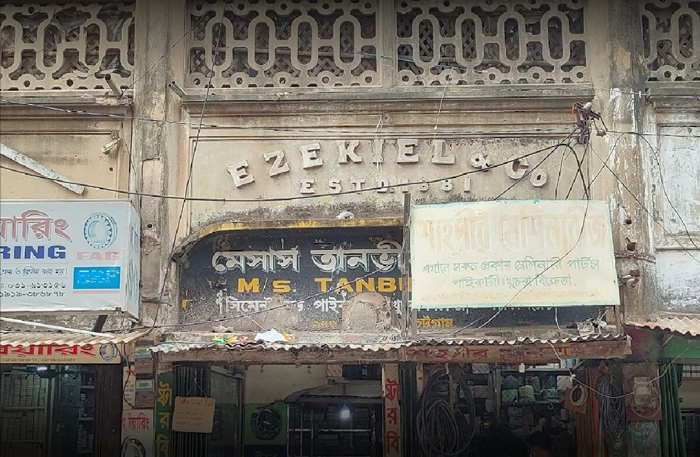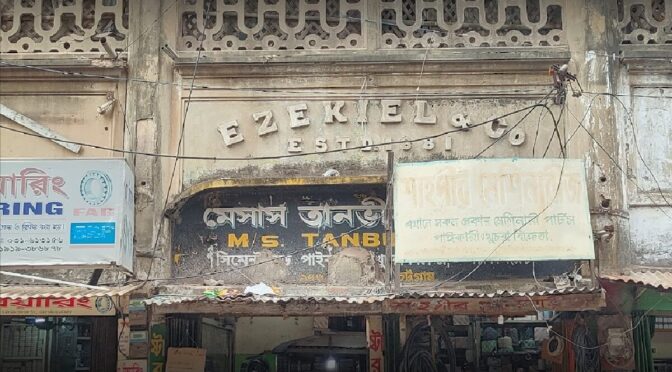By Joseph Jude Edward
APRIL 20, 2023

This building is located in 3 Strand Road, Chittagong (Chattogram) 4000, Bangladesh. The building is at the entrance of Sadarghat Road approximately 100 meters away from the General Post Office (GPO).
Looking back into the history, in 1881, the Ezekiel family established their business as sugar manufacturers and distillers. Then, on April 18, 1929, David Ezekiel had executed a power of attorney in favor of his nephew, Solomon Ezekiel. At that time David was the proprietor of two businesses, one known as Davidson & Co. that continued on in Calcutta, and the other known as S. Ezekiel & Co. that continued on in Chittagong. Both the businesses traded in general stores and wines and spirits.
The Ezekiel family built the building in Chittagong during the time of the Bengal Presidency, which was officially the Presidency of Fort William and later Bengal Province, a subdivision of the British Empire in India. After the India/Pakistan partition in 1947, their business continued to stay in operation in East Pakistan (now Bangladesh). However, shortly after the India/Pakistan partition in 1947, all the members of this family migrated to other countries. At that time there were only 5 to 6 Jewish families left in the whole of then East Pakistan (now Bangladesh).
Within the Ezekiel & Co. building in Chittagong, there was a store and other family businesses. Their main occupation was sugarcane cultivation and making alcoholic beverages in Jessore, Kushtia and Nadia areas. Davidson & Co (later incorporated as Davidsons Ltd), became the forerunner of Carew & Co under the Pakistan government. After the Independence of Bangladesh, the government of Bangladesh later nationalized the distillery at Darsana in 1973 which is currently known as Carew & Co. (Bangladesh) Ltd.
The Ezekiel & Co, building is over 140 years old. It carries the identity and heritage of a Jewish people who once lived in Chittagong.
The building was reported to be recently demolished, but several individuals from Chittagong have claimed the building is still standing.
Meanwhile, this message from Mrs. Jo Cohen provides more history:
“I found the article on the family very interesting. I had not heard about them before, but this seems to explain Shalva Weil’s assumption that my husband’s family, the Cohens of Rajshahi, sold liquor. She must have confused the two. The Cohens sold bicycles and also repaired bicycles and motorcycles, and sold spare parts and household goods like paraffin lamps and Primus stoves.
My father, Philippe E. Orian, was employed by Carew & Company after WWII to run the sugar factory at Darsana, just over the border of what was then East Pakistan. He set up the distillery and pharmaceutical works. I lived in Darsana as a very small child, and one of my earliest memories is being rushed out of the house by my parents late one night when there was quite a severe earthquake.
We had a big white two storied house with a wide verandah, and a big garden. I remember gul mohur trees, hibiscus, jasmine and plumeria, golden Orioles building their nests in the palm trees beside the lawn, jackfruit, guavas, and huge papayas. Papa was fond of hunting, and I had a small coat made from the skin of hares that he had shot.
We had to come to Calcutta for any shopping, travelling by train. I still remember the green imitation leather that covered the seats, the smell of the smoke from the coal-fired engine and the grit that would get into my eyes, the dip and swoop of the electric wires on poles beside the tracks, and the way we would rush to have a bath when we arrived! I must have been six or seven years old when we left Darsana, and though I visited Bangladesh with my husband, I have never been back. Childhood memories and a good deal of nostalgia are all that remain”.
This video was received that seems to show the building is still standing, but its future fate is unknown:

